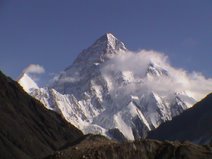
JORDAN TIMES, THURSDAY-FRIDAY, MARCH 23-24, 1995
By
Dr. S. Farooq Hasnat
RECENT INFIGHTING in Karachi received mixed reactions. On the one hand it made the opponents of Pakistan gloat with joy. On the other, countries like Jordan expressed sympathy and concern, hoping that the violent conflict would subside soon. While the unabated violence went on, a number of questions are being raised, relating to nearly all aspects of the Pakistani society. Pakistani commentators are divided in their interpretation of the situation. Some say that the authorities have not used enough force to end the violence, while others maintain that it was the arbitrary use of force that led to the present situation.
The explanation to the cause of the strife in the urban centers of Pakistan however, deserves a much more careful analysis. The dilemma has to be assessed in a perspective that is based on an understanding of developing societies that are composed of multiethnic and lingual communities. The violence has at least two causes. First, it is the result of the gradually attained defects in the administrative management of the country and second, it was escalated by the lack of the determination on behalf of the political leadership to improve the country’s infrastructure up to the demands of the day. More broadly speaking, the Pakistani domestic conflict administrative management of the country and second, it was escalated by the lack of the determination on behalf of the political leadership to improve the country’s infrastructure up to the demands of the day. More broadly speaking, the Pakistani domestic conflict has to be analyzed within the framework of a multiple of factors, ranging from the external pressures to that of the readjustment in the domestic institutions.
This situation could not have surfaced at a worse time, when in the post-cold war era, developing countries and regional groupings are striving to attract the much needed investment from abroad. It came at a time when Multinational Corporation are planning enterprises in the developing countries, where the requirement of a cheap labor can be met. Pakistan has an advantage in this regard of having a fairly large trained labor force. This also at a time when Pakistan is being pressurized to “roll-back” its peaceful program, and to subject itself to verification under the terms of Nuclear Non-Proliferation Treaty (NPT). In addition the U.S. is holding back on the delivery of the remaining F-16s it sold to Pakistan and whose full price has been paid, and is also imposing economic restrictions on the country.
On top of tract, the Pakistani private sector has not as yet replaced the bulky and highly inefficient public sector. Disintegrated sate enterprises still hold ground, making matters more difficult for the transformation. The required changes are to be made in all branches of the machinery – health, education, transportation, industry, agriculture and even communications and railway.
Success stories of the late 20th century – Singapore, South Korea, Malaysia and Indonesia were, in the 1960s and 1970s, on the same level of development as that of Pakistan. In fact, Pakistan was a role model for these countries, both in agricultural as well as industrial development in those days. One would like to remember the days when Pakistan became a favorite ground for the “Harvard Boys”, who in search of success models used to quote Pakistan extensively. The text books of these two decades are full of Pakistani examples. According to World Bank estimates and international agencies’ reports only a few years back, it was predicted that Pakistan was ready to take off and mature to become a middle income country. The departure between the two types appeared in the approach and strategy adopted by the Far Eastern nations. In those societies the private entrepreneurs did not mature out of the evolutionary process, as on the pattern of the Western capitalism. In the Asian countries, private enterprise was enforced through government channels. In other words, the government itself, on voluntary basis, decided to lessen its power, so as to raise the economic standards of the country.
The main hurdle obstructing the economic, social and administrative development of Pakistan can be attributed to the lack of adequate political acumen and development of modern institutions. The leadership was either too weak to initiate a progressive program or it was occupied with such grave problems as the Soviet invasion of Afghanistan. The absence of the continuity of political leadership was yet another reason for the lack of enthusiasm in the development of Pakistan. It must be mentioned here that from 1993 five prime ministers changed hands each one having his or her own manifesto.
In spite of the above mentioned factors, the future is far from gloomy. There is a long list of recent successes, both in foreign as well as domestic spheres. Pakistan recently hosted a summit of Economic Cooperation Conference (ECO), where important decisions on trade, and communication were taken by the member nations of Iran, Turkey, the Central Asian Republics and Azerbaijan.
Pakistan has been instrumental in providing humanitarian aid to the people of Afghanistan, while maintaining strict neutrality in the internal affairs of that country. While the struggle went on in Kashmir, Pakistan continued to provide moral support to the victimized, in spite of enormous external pressures. Another feat is the opening of a new land route between Pakistan and the Central Asian republics, especially Uzbekistan. Transit through Afghanistan still poses serious hurdles, but with the inaugural trip successfully concluded, there are bright prospects that a regular service could operate in the future.
On the domestic front, Pakistan has been able to adhere to the 1973 constitution, despite of the martial law period of 1977-1988. General Zia could not abrogate the constitution but rather chose to set it aside. The bases provided by the current Constitution represent unanimity of national opinion as it was agreed by all the parties elected to the parliament in 1970 elections. The constitution provides a chance for the political institutions to strengthen and develop. At least, a foundation has been laid.
Pakistan is too important a country to be ignored in any future regional readjustments. In the changing circumstances, Pakistan has to play a significant role and reconstruct its relations with its traditional allies. Still further, it has to put its options in proper perspective.


No comments:
Post a Comment